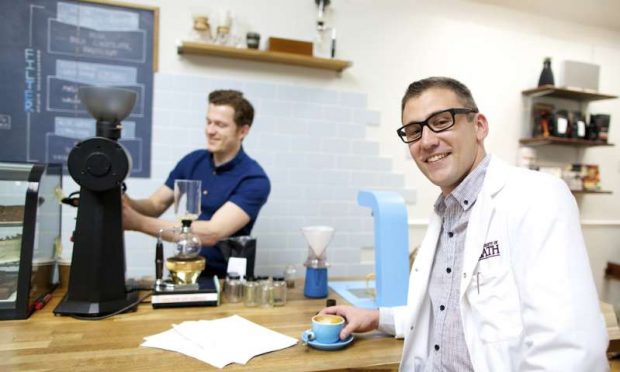
Maxwell Colonna-Dashwood and Christopher Hendon at the Colonna and Small’s shop in Bath. University of Bath photo.
New research from scientists at the University of Bath suggests that chilling roasted coffee beans just prior to grinding results in narrower distribution of small particles, allowing for a more controlled extraction while brewing.
Researchers studied the effect of grinding on coffees from room temperature to -196°C, finding that the colder coffee resulted in a more uniform particle size, which has essentially been the end goal since the inception of coffee grinding itself.
The research was conducted with participation from Colonna & Small’s, the Bath coffee shop founded and co-owned by three-time UK Barista Champion and three-time World Barista Championship finalist Maxwell Colonna-Dashwood, as well as by several notable names in the coffee science sphere, including Matt Perger (Barista Hustle), Christian Klatt (Mahlkönig) and Stephen Leighton (Has Bean Coffee).
Also leading the research was Christopher Hendon, who now works at the Massachusetts Institute of Technology. Hendon and Colonna-Dashwood broke equally important coffee research ground beginning in 2014 with their collaborative studies on the effects of water on coffee that led to the publication of the book Water for Coffee.
While the study on grinding was published in Scientific Reports in April, the University put out a press release promoting the work today, citing the run-up to the World Barista Championship taking place next week in conjunction with the Specialty Coffee Association of Europe World of Coffee Event in Dublin, Ireland.
“The research suggests that temperature of bean needs to be more constant to help us achieve consistent grinds. It suggests that cooler temperatures will allow us to maximize surface area and utilize more of the coffee,” Colonna-Dashwood said in the university-issued press release. “All of this will impact on how we prepare coffee in the industry, I bet we will see the impact of this paper in coffee competitions around the globe, but also in the research and development of new grinding technology for the market place.”
The published version of the study can be found in full here, while Perger provides additional analysis and insight here.
Nick Brown
Nick Brown is the editor of Daily Coffee News by Roast Magazine.






Comment